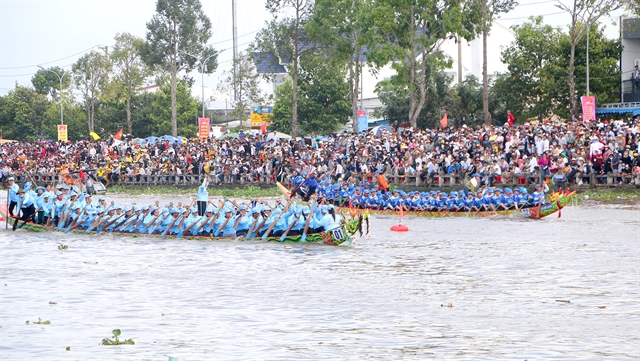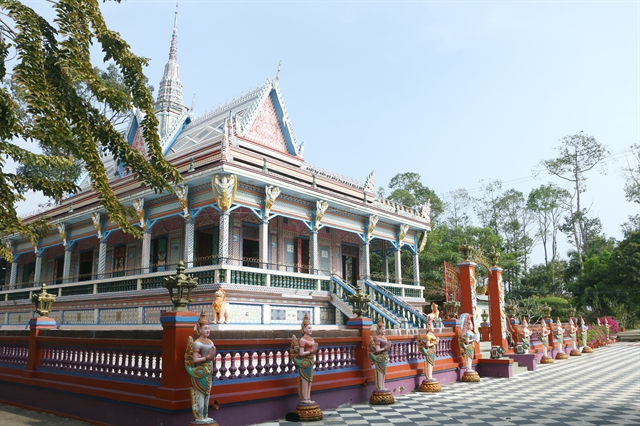
A crowd of locals and tourists enjoyed the Ngo (Khmer long boat) race from November 25-27 in the Mekong Delta province of Sóc Trăng. The Ok Om Bok festival - Ngo boat race, one of the largest annual festivals of the Khmer people, has been developed as a unique tourism product in the province. VNA/VNS Photo
SÓC TRĂNG — The Cửu Long (Mekong) Delta province of Sóc Trăng plans to develop tourism into its spearhead economic sector by 2030.
Noted for diverse cultural resources, festivals of the Kinh, Khmer, and Hoa ethnic groups that live in the province, ancient pagodas, riverside orchards and coastal wetlands, Sóc Trăng has emerged as one of the most popular destinations for culture tourism, spiritual tourism and eco-tourism in the country.
The province is home to 93 ancient Khmer pagodas with splendid architectural styles, two of which - the Mahatup pagoda (popularly known as Bat pagoda) and Kh’Leang pagoda - were recognised as national cultural-historical relics.
As temples and pagodas play a significant role in the spiritual life of the Khmer ethnic group, who account for more than 30 per cent of the province's population, their cultural identity is deeply expressed through the system of temples and pagodas.
Ancient pagodas such as Srolon Pagoda (Chén Kiểu pagoda), Khleang Pagoda, and Bửu Sơn Tự (Precious Mountain Temple), popularly known as Clay Pagoda, are some of must-see tourist attractions during a trip to Sóc Trăng, drawing thousands of domestic and foreign tourists and cultural researchers every year, according to the provincial Department of Culture, Sports and Tourism.

Srolon pagoda (Chén Kiểu pagoda), a must-see tourist attraction during a trip to Sóc Trăng Province. VNA/VNS Photo
Home to eight national intangible heritages such as Đờn ca tài tử Nam Bộ (southern folk music), Dù Kê Theatre (a style of Khmer musical theatre), Rom Vong dance, and Nghinh Ông (Whale Worship) festival, the province boasts enormous potential for cultural tourism.
Recognised as a national intangible cultural heritage, the Ok Om Bok festival - Ngo boat race, one of the largest annual festivals of the Khmer people, has been developed as a unique tourism product in the province.
The festival, held November 25-27, attracted more than 135,000 visitors this year, according to the department.
Huỳnh Thị Diễm Ngọc, deputy chairwoman of the provincial People’s Committee, said the festival aimed at honouring and preserving Khmer cultural traditions as well as foster solidarity and cultural exchanges among the Kinh, Khmer, and Hoa ethnic groups in the province.
With a range of cultural, arts, sports and tourism activities, the festival helped drive tourism growth and enhance the engagement of the community in tourism activities, she said.
With islets stretching over 50 km along the Hậu River along with more than 70km of coastline and the coastal wetland ecosystem, the province has favourable conditions for the development of eco-tourism.
Community-based eco-tourism models have been developed in the Mỹ Phước islet, Cù Lao Dung (Dung Islet), and Hưng Phú commune.
Phú Quốc Express and Superdong Fast Ferry Kiên Giang JSC offer daily speedboat service from Trần Đề port in Sóc Trăng province to Côn Đảo Island in Bà Rịa-Vũng Tàu province, linking the Mekong Delta with the untouched white-sand beaches in Côn Đảo.
Key tourism products
The province has set a target of receiving 2.3 million visitors, including 64,000 foreign visitors.
Tourism revenue is estimated at VNĐ1 trillion (US$41.1 million).
She said that to fulfil this target, the province has focused on efforts to step up digital transformation and the application of information technology in tourism activities.
She said that the province has been implementing many favourable mechanisms and policies to attract investment in infrastructure and tourism products and services.
The tourism sector has stepped up links with other localities in the Mekong Delta and HCM City to develop new inter-provincial tours to lure more visitors.
The province's master plan for tourism development from now until 2030 outlines ten essential tourism products that will receive priority for investment, including eco-tourism in Mỏ Ó Beach, Hồ Bể Beach and Dung Islet, cultural tourism in Ngã Năm floating market, agricultural tourism in Mỹ Phước islet, Giếng Tiên culture complex, and Tân Huê Viên tourist site in Châu Thành district. —VNS
OVietnam